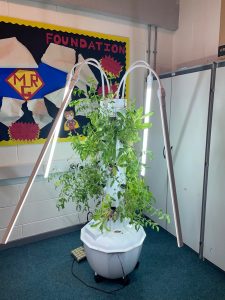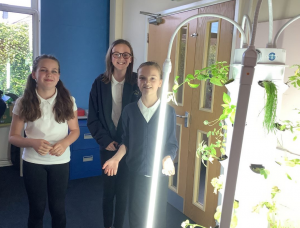Thinking about the lifestyle choices we make and discovering the impact those decisions can have on our future health and that of generations to come, is the essence of LifeLab’s work.
Before the pandemic we had begun to broaden our work with secondary school students, looking at how their food choices not only impact their own health but that of the planet too.
Through the Cultivate! project, led by Dr Lucy Green and Dr Mark Chapman and funded by the

University of Southampton Public Engagement with Research unit, young people had the opportunity to take part in hands-on activities including escape room style lessons, a visit to the plant laboratories at the University of Southampton and considering what changes they could make to their own lifestyles after exploring some of the impacts of food production on the environment.
Using an extension to the Cultivate! Funding, we created an opportunity for primary school students building on Early LifeLab work, which introduces those same themes.
This brand new programme was developed by our primary educator specialists building on resources from Rethink Food – a not for profit company that works to achieve food security for life by changing the way we think about food. This programme aims to encourage primary children to think about their food choices as they transition to secondary school, considering the health factors and sustainability of what they eat.
Using another of LifeLab’s core foundations of allowing young people to make their own choices by self-discovery and hands-on experiences, our new programme is centred around a hydroponic growing tower gardening system provided by Rethink Food. This innovative system, allows schools to grow plants indoors without soil. LifeLab has delivered these novel towers into participating schools to enable them to have an immersive learning experience.
Year 6 students in two Southampton primary schools, Mansbridge Primary and Basset Green Primary

and Cantell secondary school to which most students will transition in September have each been provided with a growing tower and a range of seedlings. The brief is for them to grow their own food to create a meal which they will hopefully be able to share together before the end of the school year.
Alongside the towers, the LifeLab team has developed supporting education sessions that focus on themes of understanding what a healthy diet looks like, how choices are going to change as the young people move up to secondary schools and touching on the sustainability of our food choices, linking to climate change. This is intended to support their transition to secondary school and provide skills which will help students to make informed food choices once they gain the freedom that secondary school gives them.
Alison Von Landau, Year 6 teacher and English lead, said: “We have loved having the growing towers at school as they are a great way of engaging children in the themes of healthy eating and the impact on the environment. Using this topic as part f their transition journey has also been a really useful tool as they look forward to more independence over their food choices.”
Comments from the pupils include: “Healthy eating’s really important, so I hope our vegetables grow. I want to try them.”
The programme also includes introducing pupils to their new school environment with a video tour of the canteen and feedback from current secondary students so they will feel confident and excited about moving schools in September.
Rachel Gagen and Natasha Green have been developing the programme for Early LifeLab. Rachel said: “We have built on the themes that underpin LifeLab in allowing young people to explore the lifestyle choices they make through scientific discovery, and this project really continues that idea alongside the wider considerations of the planet and sustainable food themes. Year 6 seemed like a good year to introduce this programme given the transition up to secondary so it has the added benefit of helping with familiarising them with what they school experience will be like in the years ahead.”
Natasha added: “The growing towers are a great hands-on and visual way of engaging the students in these themes around sustainable eating and growing your own produce. The towers are a fun and effective way to grow produce using just 10 per cent of the water normally used, and growing three times as fast which really helps with engagement in the programme in a school setting.”